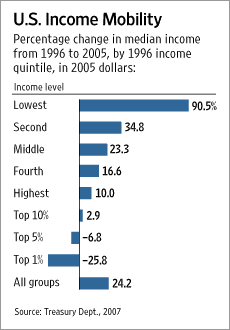 Show me a country anywhere that can match this chart, with the possible aberration of China, and I'll be stunned.
Show me a country anywhere that can match this chart, with the possible aberration of China, and I'll be stunned.Prepared by the U.S. Treasury Dept. from a scan of nearly 100,000 tax returns (vs. polls of 1,100 that purport to tell the electorate's whims), the study shows that America continues to be a nation where people move up.
Over 90% of the people in the lowest income bracket over up in income between 1996 and 2005, as did over a third in the second lowest, and nearly a quarter in the middle income bracket.
And those super rich, who just keep getting richer at the expense of everyone else. A quarter of them saw their income nose-diving, which is the other part of America's great free market capitalist machine. John Edwards, you'd better tax the daylights out of them now before their income (like yours, presumably) starts to tumble.
 In presenting this data in an editorial today, the WSJ concluded:
In presenting this data in an editorial today, the WSJ concluded:Opportunity is knocking, so there's no need in America to open the door to populism or more big government handout programs.All of this certainly helps to illuminate the current election-year debate about income "inequality" in the U.S. The political left and its media echoes are promoting the inequality story as a way to justify a huge tax increase. But inequality is only a problem if it reflects stagnant opportunity and a society stratified by more or less permanent income differences. That kind of society can breed class resentments and unrest. America isn't remotely such a society, thanks in large part to the incentives that exist for risk-taking and wealth creation.
The great irony is that, in the name of reducing inequality, some of our politicians want to raise taxes and other government obstacles to the kind of risk-taking and hard work that allow Americans to climb the income ladder so rapidly. As the Treasury data show, we shouldn't worry about inequality. We should worry about the people who use inequality as a political club to promote policies that reduce opportunity.
Labels: Economic Policy, Economy, John Edwards, Politics




<< Home